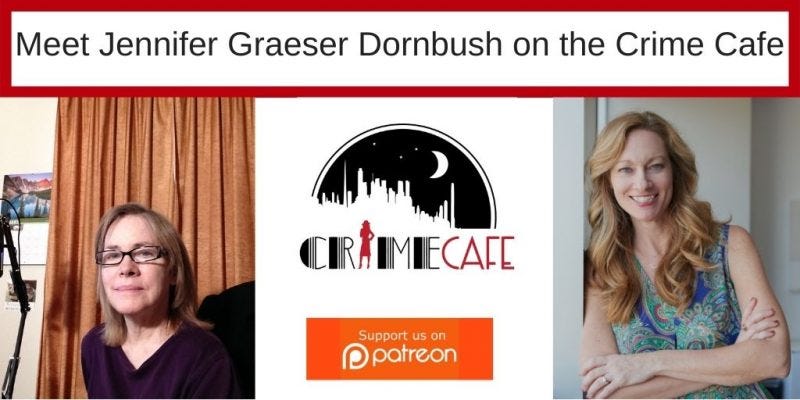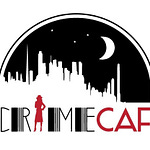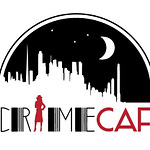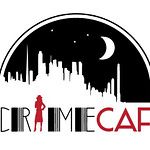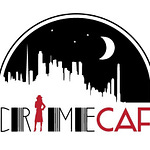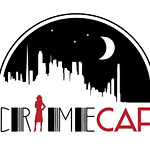Subscribe: Apple Podcasts | Google Podcasts | Spotify | Stitcher | Blubrry | Email | TuneIn | RSS | More
This episode of the Crime Cafe podcast features my interview with crime writer Jennifer Graeser Dornbush.
Check out our interview to learn more about her fiction and how she got into screenwriting.
This is the Crime Cafe, your podcasting source of great crime, suspense and thriller writing. I’m your host Debbi Mack. Before I bring on my guest, I’ll just remind you that the Crime Cafe has two eBooks for sale: the nine book box set and the short story anthology. You can find the buy inks for both on my website, debbimack.com under the Crime Cafe link. You can also get a free copy of either book if you become a Patreon supporter. You’ll get that and much more if you support the podcast on Patreon, along with our eternal gratitude for doing so.
Check us out on Patreon: https://www.patreon.com/crimecafe
Debbi (00:54): But first, let me put in a good word for Blubrry podcasting.
I’m a Blubrry affiliate, but that’s not the only reason I’m telling you this. I’ve been using Blubrry Podcasting as my hosting service for my podcast for years and it’s one of the best decisions I ever made. They give great customer service, you’re in complete control of your own podcast, you can run it from your own website, and it just takes a lot of the work out of podcasting for me. I find for that reason that it’s a company that I can get behind 100% and say, “You should try this.” Try Blubrry. It doesn’t require a long-term contract, and it’s just a great company, period. It also has free technical support by email, video, and phone, so you can get a human being there. Isn’t that nice?
If you want to podcast, try out Blubrry. No long-term contract, excellent distribution, and great technical support, too, by email, video, and on the phone. I’ve included an affiliate link on this blog.
Here’s a PDF transcript of the interview!
Debbi: Hi everyone. My guest today is a screenwriter, author, speaker, and forensic specialist. Along with her crime fiction, she’s published a book on forensics called Forensic Speak: How to Write Realistic Crime Dramas. That’s what we need—more realism, yeah. She has also developed film and TV projects with Lifetime TV, Echo Lake, and many other producers. She’s consulted on forensics with writers on shows like Bull, Hawaii Five-O, Leverage and other shows. It’s my pleasure to introduce my guest, Jennifer Dornbush. Hi, Jennifer. How are you doing?
Jennifer: Hello. I’m very well. Oh, I’m little sick as we just mentioned, but I’m fine. Everything will be fine.
Debbi: But otherwise, you’re fine.
Jennifer: Everything will be just fine.
Debbi: It will all work out perfectly. It will all be just fine.
Jennifer: In the scope of things, I am great.
Debbi: As my sister likes to say, what could possibly go wrong? Anyway, you do so many things, it’s hard to know what to ask you about first, but tell us about your series, the one featuring Emily Hartford. What are your stories about?
Jennifer: Yeah, thank you. Yeah, this is my Coroner’s Daughter mystery series. There are two books that are actually published live and out there, and there are three more on the way. Just recently signed a three-book deal with Blackstone Publishing, and so the next one will be coming early 2023. Basically, they feature Dr. Emily Hartford who’s a young, up-and-coming doctor in Chicago. She’s also the daughter of a coroner who left her home when she was a teenager due to tragic circumstances, which I will not reveal cause that’s part of a big storyline in the book, but she is suddenly called back to her hometown because her father has had a heart attack and she’s been estranged from him for 10 years. And so, it’s kind of about her returning back and sort of stepping into his shoes, basically doing death investigations in a way she never expected for her life to turn in that direction. She never expected to come back home, so she’s basically trying to run murder mysteries while also contemplating her medical career in the big city and that is her story.
Debbi: Is the first book The Coroner?
Jennifer: The first book is The Coroner. The second book is Secret Remains and the whole series is called The Coroner’s Daughter.
Debbi: Right, because I just started reading the first one and I was pulled right in actually by the scenario.
Jennifer: Thank you.
Debbi: Which she has to go do this surgery and she seems so nervous.
Jennifer: Yes. Yeah, yeah. She’s really this brilliant surgeon and has just gotten engaged. Has this great fiancé, but then there’s this hometown sweetheart that’s sort of the love that got away. So yes, emotionally too, it’s going to be a series about her being really torn between two places and helping people in the surgery room or helping solve mysteries.
Debbi: Wow. That’s excellent. it sounds like you have a plan for this series. You’ve got books 3 to 5 planned to be released starting next year. Is there a story arc that works its way through the series?
She’s really this brilliant surgeon and has just gotten engaged. Has this great fiancé, but then there’s this hometown sweetheart that’s sort of the love that got away.
Jennifer: There will be, absolutely cause every book will be its own murder mystery of course and she gets pulled in in various ways into these mysteries and why she has to work on them. But then there’s also a really strong, emotional, just kind of personal arc of her. It’s the story about a woman trying to find out who she is again, cause when she left her family in her hometown at 15, 16, she was one person and she has to find that person again. Who is the real Emily and where does she belong? Does she belong in Chicago? Does she belong in this small town, this area, doing the things she sort of grew up doing alongside her father that she loved? Does she marry the cool surgeon from Chicago? Does she marry the really awesome detective hometown hero kind of person?
So yes, emotionally too, it’s going to be a series about her being really torn between two places and helping people in the surgery room or helping solve mysteries.
It’s really about her too. I think there’s that point in all of our lives, because when we meet her, she’s like 27, 28, 29. She’s kind of on that cusp where we all kind of look back and say, okay, what? Who really am I? What am I doing with my life? How am I going to shape my life from here on out? And so, she’s at that point in her life where it’s like who am I? What am I going to do with all this? She has this great toolbox of skills, and I think a lot of us are fortunate enough to be faced with that when we have so many amazing things and opportunities and choices we could do, but what is the best thing for us to do? How are we going to make the most impact on the world while also fulfilling our purpose and our soul?
Debbi: That’s great. It sounds almost like you have a great concept here for a television show, frankly.
Jennifer: I hope so. We’re working on it. I was contracted last year with Lifetime TV to develop the first two books as movies. They’re doing this thing that they call a movie wheel, which is almost like a Movie of the Week. It’s like a series of movies, and so we’re writing the first two right now. We’ve written them and we’re kind of waiting to hear now from Lifetime if they’re going to go ahead with them and what that looks like, and so we’re kind of in a “fingers crossed” moment.
They’re doing this thing that they call a movie wheel, which is almost like a Movie of the Week. It’s like a series of movies, and so we’re writing the first two right now.
Debbi: Oh wow. It’s that production hell period?
Jennifer: Gosh, yes. That pre-production or development hell. That’s what we’re in…
Debbi: Development hell. That’s it.
Jennifer: That’s what we’re in.
Debbi: Thank you.
Jennifer: Development purgatory!
Debbi: Exactly. Yes. Oh, I love those terms.
Jennifer: Oh goodness.
Debbi: The whole idea of hell or purgatory going along with all this stuff.
Jennifer: I think it’s been more like purgatory. It’s actually been a really great experience working with Lifetime and the producers, and now it’s just like we’ve delivered and we’re waiting to get the green light, so…
Debbi: Well, I’ll keep my fingers crossed for you. How did you end up writing screenplays? I understand you wrote them before you wrote novels.
Jennifer: I’ve always been a writer. I always knew I was going to be a writer since I was a kid, but when I was in college, I really started to study in Hollywood and really learn, understand the craft of film and TV making and then kind of ran away from it for a while. Came back to it 10 years later and moved to LA, dove in, really started to study the screenwriting craft, so that’s kind of where my first truly trained writing experience comes from. I love the medium of screenwriting. I really do. It really sharpens you as a writer. It really makes you think through a story and plot and character. And then of course you have to be really succinct writer. It’s funny, cause as a novelist, it’s always about how many words, the more words, the more words, the more pages and as a screenwriter, it’s the opposite. We can only have a hundred pages. It’s always about cutting so it’s really interesting how it exercises two parts of the brain. I love them both, but my first 15 plus years I spent writing screenplays.
I love the medium of screenwriting. I really do. It really sharpens you as a writer. It really makes you think through a story and plot and character. And then of course you have to be really succinct writer.
Debbi: I think it’s great training for writing the novels, frankly, because you really learn about how to create characters and believable dialogue and what’s needed and what isn’t. I mean, as far as novels go, you can just expand on what you’ve got after you’ve got the screenplay.
Jennifer: Right, right. It’s so true. I find I never have any problem writing dialogue. It’s like writing screenplays, you start to hear those voices all the time. You’re just living with that. And it’s really true. I’m really grateful for my screenwriting training and I think it makes you a very visual writer. I know people have read my work and said, oh my goodness, I could picture this. It read so fast. I can picture what’s happening as if it’s a movie. I’m like, there’s a reason for that.
Debbi: Absolutely. What kind of schedule do you keep for writing novels versus screenplays? How do you divide your time? Because I find it’s a struggle. I do both also, but not nearly as successfully as you do.
Jennifer: I keep a writing schedule in general. I’m a very business minded individual. I just do my nine to six or seven schedule. I keep business hours and I try to take my weekends off and I try to keep work and home separate because I think it’s healthy. So, for me, whatever projects are on my plate is what gets worked on, so I’ll look at what’s due and when and how long is it going to take me to get it done, and I’ll break it into blocks of weeks and this week I need to work on this screenplay and this novel so it changes all the time, honestly depending on who wants what.
I keep a writing schedule in general. I’m a very business minded individual. I just do my nine to six or seven schedule. I keep business hours and I try to take my weekends off and I try to keep work and home separate because I think it’s healthy.
Debbi: It helps to be flexible when you do this stuff. As you said to keep a schedule as far as writing goes, that discipline is very important.
Jennifer: Very important. I spent probably the first five plus years of my writing life just figuring out the discipline part and becoming disciplined, because at that point, there’s nobody really looking or asking for your work. You’re just creating work, creating projects, and so if you can do it then, when you’ve got no deadlines and it’s all self-motivated, then you’re set.
I spent probably the first five plus years of my writing life just figuring out the discipline part and becoming disciplined, because at that point, there’s nobody really looking or asking for your work.
Debbi: Yeah, you really do have to be self-motivated at first, but if you can get noticed then…. It’s very speculative though.
Jennifer: Oh yes. Very.
Debbi: And one thing that I think discourages many authors from trying to write screenplay is the fact that the industries, while in a way connected, are very, very different. You have to follow two industries at once.
Jennifer: You do. It’s kind of exhausting.
Debbi: It is. Really is.
Jennifer: I was surprised at how different they were. I mean, I always knew they were different, but they are very different. I’m grateful for my literary agent because she’s the one who really helps me follow the book industry. Whereas the Hollywood industry, the screenwriting, the entertainment industry, I really follow because that’s where I started obviously. And so really in that industry, the Hollywood industry, you really have to be your own advocate, even more so than in publishing, because I rely on my agent for so, so much. In the literary industry, as an author, you can’t just submit stuff. You can’t just query really. A lot of times, things do have to go through an agent, so I don’t even have the opportunity to make those relationships until I actually sell something, and then I’m making a relationship through an editor and stuff. But with Hollywood, it’s a complete opposite. You really need to be out there. Yes, agents and managers have their place. They do. But at the end of the day, it’s up to you to pound the payment and make the relationships and knock on the door.
A lot of times, things do have to go through an agent, so I don’t even have the opportunity to make those relationships until I actually sell something, and then I’m making a relationship through an editor and stuff. But with Hollywood, it’s a complete opposite. You really need to be out there.
Debbi: Absolutely true. It’s so true. It is very much a business of relationships because it’s a group project, essentially. Anything you do in screenwriting is going to be a group project.
Jennifer: Exactly. Exactly.
Debbi: That’s why it’s so important to make those relationships, to establish them so that people will trust who you are, where you come from, all that stuff. Can they work with you?
Jennifer: Exactly. It’s so true. And being a part of a team now that I’ve been working on this Lifetime project, I’ve been a part of this team now for probably two and a half, at least two and a half years, these producers, and then we added a third and you really do become a team for a long time, for years so it’s important to be a team player.
Debbi: It’s big. It’s huge. There are a lot of moving parts. What are you working on now?
Jennifer: I’m working on the next book for The Coroner’s Daughter, which I’m titling right now Last One Alive. We’ll see if that sticks. Then in the midst of all these Lifetime movies, I’m actually working on two TV pilots, which are just speculative. They’re just things that I’m personally working on with different entities, just to kind of have a little help, but one of them is based on a thriller I wrote called Hole in the Woods based on a true crime thriller. I’m developing that into a limited series, and the other one is actually not crime related at all, but just sort of a passion project I’ve had for about 20 years and is more of a historical biopic.
Debbi: I was going to ask you about your true crime thriller. Tell us a little about that.
Jennifer: Hole in the Woods is based on a case that I followed for over 25 years from my hometown. It is fictional. The story is fictional, but there’s a lot of the people and the circumstances that are very tied closely to what actually happened. The main character is kind of a fish out of water Detroit detective who’s been called into this small town in Michigan to work on this cold case. It’s really not a whodunit because everybody knows who done it, but they have never been able to capture these people. And so, she comes in and she sort of has to unlayer or delayer—I don’t know—peel back the layers of this town and its people to figure out how she’s going to pin this murder on these two brothers and if they actually did it and who’s involved, and were there more people involved? So anyway, it’s kind of all these layers that she has to figure out, and it’s really a story of people keeping secrets.
Debbi: And it’s based on a true event?
Jennifer: Yes. It’s based on a true crime, a true murder, brutal murder rape case that happened when I was … I guess I would’ve been 18 at the time and so was the gal who was killed. I just followed her case and her story. I got to sit in on her trial about six years ago, no seven. Oh my goodness, almost seven years ago, they finally did catch the guys who did it and put them to trial. It was a pretty incredible case. I researched it for a long time and it took me almost five years to write it. It’s very emotional and I tell it from a lot of different points of view, but it’s very interesting. It has a very redemptive ending.
Debbi: That sounds interesting. Very interesting. What writers inspire you most?
Jennifer: Oh my goodness—so many—and excuse my voice because I’ve had struggling with a sore throat all week.
Debbi: You’re a trooper.
Jennifer: Oh gosh. I just need a cough drop. That’s what I need. I have been reading and listening to stories since I was a baby. My parents were so good about telling us stories, reading stories to us. We were constantly going to the library. They would buy books for us. We had a book fund, so we would be able to once a month take money out of the book fund and we could pick any book we wanted to purchase. So, when people ask my favorite authors, there’s just been so many throughout the years I think that have shaped me from children’s literature through great classics.
I love great classic literature. I love it and I studied it. One of my majors in college was classic literature, so gosh, I had so many. So very, very many. I do believe that people should read the great classics. I think it’s so fundamental for us as storytellers, but I was thinking about this question because I get it a lot and thinking of one book, the one book in my life that I have read over and over and over since I was a kid and I read it almost every day. I read this book almost every day – parts of it – and I’ve read it in many different versions and it never gets old. It has some of the most incredible stories and poetry in the world, and it’s the Bible, the Holy Bible. I have read that book since I was a kid, and I would say that’s definitely the most influential book in my life just because it’s just pretty incredible. It’s just a pretty incredible book.
I do believe that people should read the great classics. I think it’s so fundamental for us as storytellers …
Debbi: It is. It is that.
Jennifer: I’ve studied it. It’s got everything from science fiction to poetry to love stories to … I don’t know. It’s just amazing.
Debbi: I never thought of the Bible as science fiction, but it would be interesting to read it with that in mind.
Jennifer: Maybe I should say apocalyptic, like Revelations. That may be a better description. Yeah, apocalyptic.
Debbi: Very interesting.
Jennifer: It’s so descriptive. There are so many different styles of literature within the book, and so I think just from hearing it over the years. I studied rhetoric with my masters in rhetoric and rhetorically, there’s so many different styles that as a writer, it just become ingrained. I don’t know. There’s been times when I’ve struggled with it. I’m like, I don’t get what this means, whether it’s metaphorical. There’s a lot of metaphor. There are parts that are just flat out X-rated. I mean, it’s very graphic. It’s pornographic in part. I mean, it’s just got everything. Everything!
Debbi: The story that has everything. Interesting! What advice would you give to anyone who’s interested in writing for a living?
Jennifer: First of all, you have to know that it’s a calling, that you’re called. I think you have to know that it’s a calling, that you’re called to it because it is a very entrepreneurial type of career, and like you said … you didn’t use the word subjective. Speculative I think was the word you used. It’s speculative, it’s subjective, so like any art, it isn’t art like sculpting or painting or dancing or being a musician. I do believe you have to have a calling for it, and test that calling out. I did that a lot. I really tested my calling for a long time to make sure it was true. And then, read and learn and write. I mean, there’s kind of no substitute. If you’re a pianist, there’s no substitute for playing the piano every day. It’s kind of a no brainer. That’s what you do.
First of all, you have to know that it’s a calling, that you’re called. I think you have to know that it’s a calling, that you’re called to it because it is a very entrepreneurial type of career, and like you said … Speculative I think was the word you used …
Debbi: How do you get to Carnegie Hall? Practice, practice, practice.
Jennifer: Exactly. How do you get a published book? Write, write, write!
Debbi: That’s it! Send, send, send.
Jennifer: Send, send, send and never give up. Just never, ever, ever give up.
Debbi: That’s it. Never give up. Let’s see. How did you end up consulting for television? I think that is just so cool.
Jennifer: You know, I lived in LA for 14 years and a lot of my friends are writers. A lot of them write for film and TV, and so really it was just of mouth quite honestly. There’s not like a want ad or anything for us. Word got out that this is what I did and people would call or email.
Debbi: Again, it’s a function of networking.
Jennifer: Yeah.
Debbi: Let’s see. Is there anything else you’d like to add before we finish up?
Jennifer: Oh my goodness. No, it’s just such a blessing to be a part of a community of writers and readers, and I think art is going to be the thing that really saves this world so we all have to keep doing it.
Debbi: I love that thought. That is a great thought. Thank you so much for being here today.
Jennifer: Debbi, thank you so much for what you’re doing.
Debbi: It’s my pleasure. It really is. I love talking to authors. What can I say? I just want to remind everybody before I go that if you support the podcast on Patreon, you’ll get access to downloads of both Crime Cafe ebooks: the nine-book box set and the short story anthology. You can also buy them from any major retailer, so please consider checking out the Patreon page and you’ll see that the patrons also get access to bonus videos and audio chapters of my work if you contribute at a certain level. On our next episode, I will have Robert McCaw, and until then, take care and happy reading.
*****





